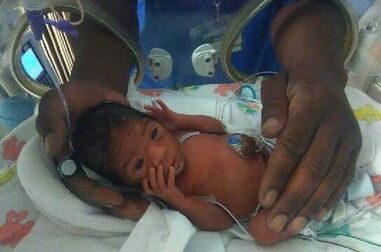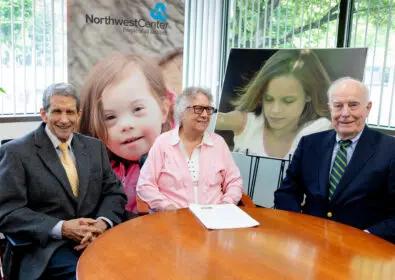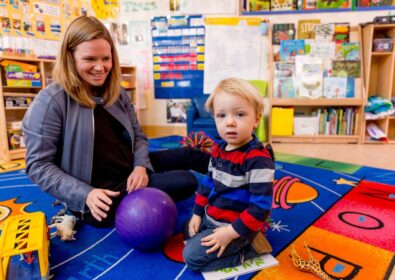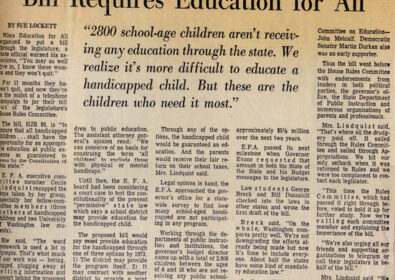Juana didn’t meet the son she gave birth to until he was ten days old.
It was the summer of 2017. She was five months pregnant. When the weather turned extremely hot, it aggravated her asthma.
“The air quality was bad,” Juana (pronounced JAAN-uh) says. “I kept going back and forth to the hospital saying I couldn’t breathe.”
Once admitted, Juana went into cardiac arrest. Doctors placed her into a medically induced coma and delivered Terrance at just 26 weeks. He stayed in the NICU for three months.
When Terrance began missing milestones, the family was referred to Early Supports services from Northwest Center Kids.
“I didn’t know anything going into this about what occupational therapy was or what Terrance needed,” Juana says.
The Northwest Center Kids Early Supports (Kids ES) team quickly put her at ease.
“They came to my home,” she says. “They make it very easy. There was a speech therapist, a nutritionist and an occupational therapist to make sure he was eating, and a physical therapist for him to learn how to sit up, then stand, and then walk.”

She liked that the team individualized strategies for Terrance.
“They just said, ‘We’ll try a couple things to see if he likes it. We’ll see where he’s moving forward and nurture that.’”
The team was also able to provide items for the family like a high chair so Terrance, who had spent his first weeks using a feeding tube, could practice sitting and feeding himself; and orthotics to help him walk, decorated with airplanes and fire trucks.
As Terrance progressed, Early Supports tailored services to work toward the family’s new goals.
“He started eating regularly, so we didn’t need the occupational therapy anymore,” Juana says. “He started walking and running normally, so we didn’t need the orthotics anymore.”

New Challenges, Steadfast Support
COVID-19 brought new challenges.
“After the heart attack, my immune system wasn’t so great,” Juana remembers.
To keep families safe, Early Supports pivoted to teletherapy. Like most people at the time, Juana had never heard of Zoom, so the team helped her learn.
“Our first Zoom meeting had the occupational therapist, physical therapist, speech therapist, and [family resources coordinator] Melinda,” Juana remembers. “They said, ‘If you need anything, just let us know.’ I needed help with everything, basically, during the pandemic. When I needed a stroller, Melinda brought me the stroller that we use to this day. If I needed diapers, she was right there. And she would bring me extra things: wipes and masks, toothpaste and toothbrush, diaper cream, clothing and shoes for him, so I wouldn’t have to go out.”
Then, in April 2020, a new worry: Terrance, now two-and-a-half, had become withdrawn. He was diagnosed with Autism Spectrum Disorder (ASD).
Once again, Early Supports stepped in for the family. They reassured Juana: “’Now we know, and now we can move forward,’ they said.”
But the stress began to take its toll. With Terrance approaching three years old, Juana needed to prepare to transfer him to a pre-K program. (Early Supports services are for children from birth to age 3, which is a critical time in a child’s development.) Juana’s paperwork was overwhelming, especially because the pandemic had closed off normal resources like the printers and fax machines at the library.
“I had to register him for SSI [Social Security benefits],” Juana remembers. “I had to register him for school. I needed to mail certain things. I needed to copy certain things and fax it over.”
Once again, her family resources coordinator was there. “Melinda was like, ‘Let’s pull up those files on Zoom, and we can get them filled out, and I can come over and have you sign them, and then I can send them out for you.’ That was why I was able to register him for SSI and why I was able to register him for school.”
Then Terrance began hurting himself.
“He was scratching himself—his legs, his stomach, his arms,” Juana says. “It was starting to worry me a lot; I didn’t want him to use that as some kind of coping mechanism. It was leaving a ton of open wounds.”
Juana was so overwhelmed that when she tried to ask her Early Supports team for suggestions, she burst into tears.
“It wasn’t just over him scratching himself. It was about the pandemic,” she remembers. “It was about the Black Lives Matter marches—I have a Black son. I was just so scared of life in general. There were so many things to be worried about at that time, and then him being diagnosed with autism and scratching himself. I just broke down.”

Ready for the Future
Northwest Center Kids Early Supports responded with new strategies:
- Weighted blankets to help Terrance feel more secure.
- Juana set up a daily schedule for Terrance, similar to one he would follow when he starts school, so he’d get used to a new routine. She was skeptical, “But it worked!” she says.
- Because Juana liked singing to Terrance, they encouraged her to sing to help calm him. “They suggested all these songs I already know,” Juana says. “I hadn’t even thought of that. That has actually been the most helpful by far.”
The team made sure to check on Juana, too.
“Melinda would send me things to my phone like a happy birthday GIF. She would let me know that everybody’s thinking about me.”
When the holidays approached, Kids ES came through for the family again. When Juana was unable to buy gifts or find other assistance, “I called up Melinda a week and a half before Christmas,” she says. “She literally showed up with a shopping cart full of gifts for both of my kids.”
Today, Terrance is 3 and attends pre-K classes at a school where the staff includes autism specialists. Juana says that moving on from Northwest Center services made her sad, “But they made it a happy sad, you know?” she says.
“I wouldn’t have been able to get him to this point without those services. I was so fortunate to have these services, especially during a pandemic. I’m extremely grateful.
“Now I’m confident moving to the next stage,” Juana continues, “and I know that Terrance is more confident in himself.”
“Everything that we’ve done with Northwest Center Kids Early Supports, I’ve been included. And it wasn’t just about Terrance having a disability; it was about him as an individual. They were able to give me tools so I can take care of Terrance a lot better.
– Juana, Terrance’s Mom
Visit Northwest Center Kids Early Supports to learn more about services or to inquire about a no-cost evaluation. A doctor’s referral is not necessary.



